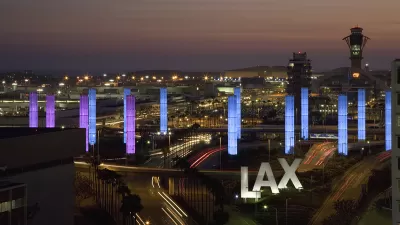A cutting-edge railroad collision avoidance system is being installed in Los Angeles. Dan Weikel and Richard Simon examine the system, and the reasons why the federal government is backing down from requirements to install the system nationwide.
Weikel and Simon report on the $201-million positive train control system, the "most sophisticated collision avoidance system in the country," which is set to be completed next year by Metrolink, the Los Angeles area commuter railroad. The system is being implemented under a 2015 nationwide deadline that Congress is now looking to relax.
According to the authors, "Federal lawmakers are being pressured by influential railroads and transportation organizations that say positive train control is very costly and tricky to install and remains largely unproven in daily operations."
However according to Richard Katz, chairman of the Metrolink Board of Directors, "This is the most important development in our lifetimes as far as rail safety is concerned. Every year we delay, more people are going to die that don't have to."
FULL STORY: Metrolink pushing forward with system designed to prevent crashes

Study: Maui’s Plan to Convert Vacation Rentals to Long-Term Housing Could Cause Nearly $1 Billion Economic Loss
The plan would reduce visitor accommodation by 25,% resulting in 1,900 jobs lost.

Alabama: Trump Terminates Settlements for Black Communities Harmed By Raw Sewage
Trump deemed the landmark civil rights agreement “illegal DEI and environmental justice policy.”

Why Should We Subsidize Public Transportation?
Many public transit agencies face financial stress due to rising costs, declining fare revenue, and declining subsidies. Transit advocates must provide a strong business case for increasing public transit funding.

Paris Bike Boom Leads to Steep Drop in Air Pollution
The French city’s air quality has improved dramatically in the past 20 years, coinciding with a growth in cycling.

Why Housing Costs More to Build in California Than in Texas
Hard costs like labor and materials combined with ‘soft’ costs such as permitting make building in the San Francisco Bay Area almost three times as costly as in Texas cities.

San Diego County Sees a Rise in Urban Coyotes
San Diego County experiences a rise in urban coyotes, as sightings become prevalent throughout its urban neighbourhoods and surrounding areas.
Urban Design for Planners 1: Software Tools
This six-course series explores essential urban design concepts using open source software and equips planners with the tools they need to participate fully in the urban design process.
Planning for Universal Design
Learn the tools for implementing Universal Design in planning regulations.
Smith Gee Studio
Alamo Area Metropolitan Planning Organization
City of Santa Clarita
Institute for Housing and Urban Development Studies (IHS)
City of Grandview
Harvard GSD Executive Education
Toledo-Lucas County Plan Commissions
Salt Lake City
NYU Wagner Graduate School of Public Service




























